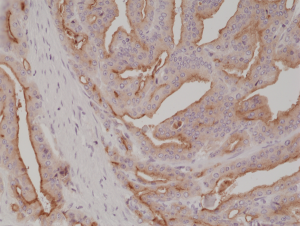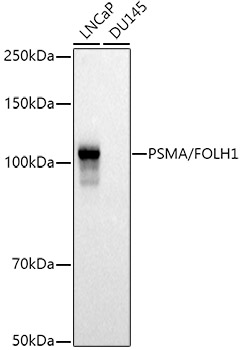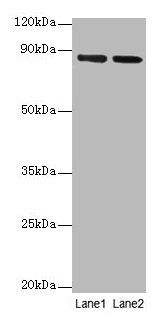
Immunohistochemical staining of formalin fixed and paraffin embedded human prostate cancer tissue section using anti-PSMA rabbit monoclonal antibody (Clone RM327) at a 1:1000 dilution.
anti-PSMA (human), Rabbit Monoclonal (RM327)
REV-31-1214-00
ApplicationsWestern Blot, ImmunoHistoChemistry
Product group Antibodies
ReactivityHuman
TargetFOLH1
Overview
- SupplierRevMAb Biosciences
- Product Nameanti-PSMA (human), Rabbit Monoclonal (RM327)
- Delivery Days Customer2
- ApplicationsWestern Blot, ImmunoHistoChemistry
- CertificationResearch Use Only
- ClonalityMonoclonal
- Clone IDRM327
- Gene ID2346
- Target nameFOLH1
- Target descriptionfolate hydrolase 1
- Target synonymsFGCP, FOLH, GCP2, GCPII, NAALAD1, PSM, PSMA, mGCP, glutamate carboxypeptidase 2, N-acetylated alpha-linked acidic dipeptidase 1, N-acetylated-alpha-linked acidic dipeptidase I, NAALADase I, cell growth-inhibiting gene 27 protein, folylpoly-gamma-glutamate carboxypeptidase, glutamate carboxylase II, glutamate carboxypeptidase II, membrane glutamate carboxypeptidase, pteroylpoly-gamma-glutamate carboxypeptidase
- HostRabbit
- IsotypeIgG
- Protein IDQ04609
- Protein NameGlutamate carboxypeptidase 2
- Scientific DescriptionPSMA (Prostate-specific Membrane Antigen) a type II transmembrane glycoprotein belonging to the M28 peptidase family. The protein acts as a glutamate carboxypeptidase on different alternative substrates, including the nutrient folate and the neuropeptide N-acetyl-l-aspartyl-l-glutamate and is expressed in a number of tissues such as prostate, central and peripheral nervous system and kidney. A mutation in this gene may be associated with impaired intestinal absorption of dietary folates, resulting in low blood folate levels and consequent hyperhomocysteinemia. Expression of this protein in the brain may be involved in a number of pathological conditions associated with glutamate excitotoxicity. In the prostate the protein is up-regulated in cancerous cells and is used as an effective diagnostic and prognostic indicator of prostate cancer. - Recombinant Antibody. This antibody reacts to human PSMA (Prostate-specific membrane antigen). Applications: WB, IHC. Source: Rabbit. Liquid. 50% Glycerol/PBS with 1% BSA and 0.09% sodium azide. PSMA (Prostate-specific Membrane Antigen) a type II transmembrane glycoprotein belonging to the M28 peptidase family. The protein acts as a glutamate carboxypeptidase on different alternative substrates, including the nutrient folate and the neuropeptide N-acetyl-l-aspartyl-l-glutamate and is expressed in a number of tissues such as prostate, central and peripheral nervous system and kidney. A mutation in this gene may be associated with impaired intestinal absorption of dietary folates, resulting in low blood folate levels and consequent hyperhomocysteinemia. Expression of this protein in the brain may be involved in a number of pathological conditions associated with glutamate excitotoxicity. In the prostate the protein is up-regulated in cancerous cells and is used as an effective diagnostic and prognostic indicator of prostate cancer.
- ReactivityHuman
- Storage Instruction-20°C,2°C to 8°C
- UNSPSC41116161








